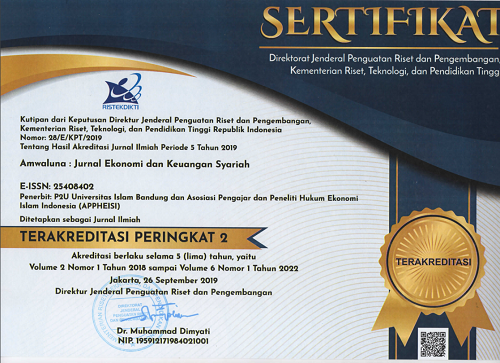ISLAMIC MONEY INSTEAD IMPLICATIONS BASED ON MACROECONOMIC AND SOCIAL VALUE VARIABLES IN INDONESIA
Abstract
The purpose of this research is to find out the implications of Islamic Money Instead based on macroeconomic and social variables value in Indonesia. The used data is secondary data of 2010-2019 time series. The method of this research is using Vector Autoregressive and Vector Error Correction Model (VECM). E-views 9 program is used for processing data. The result of this research indicates that there are implications for a variety of Islamic Money Instead in Indonesia based on macroeconomic and social value variables in Indonesia on 1st model. GDP and inflation as macroeconomic variable have positive implication for Islamic Money Instead, meanwhile the exchange rate variable has negative implication on it. On 2nd model there are implications for Islamic Money Instead based on macroeconomic variable. GDP and inflation have positive implication and greater value than the 1st model. While the exchange rate has negative implication and has not a response for Islamic Money Instead shock. Furthermore, the 3rd model indicates that there is positive implication based on social value variable not only for zakat but also infaq shadaqah
Keywords
Full Text:
PDFReferences
Ascarya, A. (2012). TRANSMISSION CHANNEL AND EFFECTIVENESS OF DUAL MONETARY POLICY IN INDONESIA. Buletin Ekonomi Moneter Dan Perbankan, 14(3), 269–298. https://doi.org/10.21098/bemp.v14i3.405
Ascarya, A., Hasanah, H., & Achsani, N. A. (2008). PERILAKU PERMINTAAN UANG DALAM SISTEM MONETER GANDA DI INDONESIA. Buletin Ekonomi Moneter Dan Perbankan, 11(1), 53 – 88–53 – 88. https://doi.org/10.21098/bemp.v11i1.235
Butra Aini, H., Tan, S., & Delis, A. (2016). Analisis Permintaan Uang Riil di Indonesia. In Jurnal Perspektif Pembiayaan dan Pembangunan Daerah (Vol. 4, Issue 1).
Chapra, M. U. (1996). Monetary management in an Islamic economy. Islamic Economic Studies, 4(1). https://papers.ssrn.com/sol3/papers.cfm?abstract_id=3165360
Gustiani, Ebrinda Daisy, Ascarya, J. E. (2010). Analisis Pengaruh Social Values Terhadap Jumlah Permintaan Uang Islam di Indonesia. Buletin Ekonomi Moneter Dan Perbankan, 517–548.
Haq Kamal, A., Purbowisanti, R., Asmara Sani, A., Retno Setiorini, K., Alma Ata, U., Brawijaya No, J., Kasihan, K., & Istimewa Yogyakarta, D. (2021). DO THE DISTRIBUTION OF ZAKAT AND ISLAMIC BANK FINANCING AFFECT INCOME INEQUALITY IN INDONESIA? Jurnal Ekonomi Dan Keuangan Syariah, 5(1), 90–102. https://doi.org/10.29313/amwaluna.v5i1.5854
Rifki Aditia, M., & Cahyono, E. F. (2018). RESPONSIVENESS OF SOCIAL VALUES AND REAL GROSS DOMESTIC BRUTO ON MONEY DEMAND IN INDONESIA. In Journal of Islamic Monetary Economics and Finance (Vol. 3).
Sabeth Abilawa, M., & Siddiq, R. (2016). DETERMINAN PERMINTAAN UANG DI INDONESIA. 6(1). http://jurnal.untirta.ac.id/index.php/
DOI: https://doi.org/10.29313/amwaluna.v5i2.7972
Refbacks
- There are currently no refbacks.
Editorial Office:
Syariah Faculty, Universitas Islam Bandung
Jalan Tamansari No. 24-26 Kota Bandung

Amwaluna : Jurnal Ekonomi dan Keuangan Syariah is licensed under a Creative Commons Attribution-NonCommercial-ShareAlike 4.0 International License.







